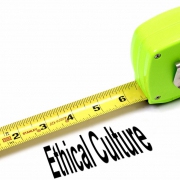Is Political Ideology a Compliance and Ethics Risk?
Cross posted with permission from ES Collaborator Jeffrey Kaplan’s Conflict of Interest blog

In a post last week on the Harvard Law School Forum on Corporate Governance and Financial Regulation, Danling Jiang, Associate Professor of Finance at Florida State University, summarizes a recent article she authored with Irena Hutton, Associate Professor of Finance at Florida State University; and Alok Kumar, Professor of Finance at the University of Miami: “Political Values, Culture, and Corporate Litigation,” which was published in the latest issue of Management Science and which “examine[s] whether the political culture of a firm defines its ethical and legal boundaries as observed by the propensity for corporate misconduct.”
As described in her post: “Using one of the largest samples of litigation data to date, [they] show that firms with Republican culture are more likely to be the subject of civil rights, labor, and environmental litigation than Democratic firms, consistent with the Democratic ideology that emphasizes equal rights, labor rights, and environmental protection. However, firms with Democratic culture are more likely to be the subject of litigation related to securities fraud and intellectual property rights violations than Republican firms whose Party ideology stresses self-reliance, property rights, market discipline, and limited government regulation.”
This is interesting – if not necessarily surprising – stuff, and particularly so in an election year. But does it bear on the work of C&E professionals? And does it have anything to do with conflicts of interest?
In a COI Blog post during the last presidential election, I noted that managers’ political ideology could create moral hazard vis a vis their respective companies: “Consider the example of corporate support for political causes or candidates for public office… In some instances, a senior manager with the power to make decisions for a company regarding such support may use that power to embrace a candidate or cause even if doing so is against her company’s interests (e.g., the cause or candidate’s positions may offend a large percentage of the company’s customers). For the purposes of our example, assume further that the manager does not expect to be tangibly rewarded for providing the company’s support to the candidate, and thus may not have a true “interest” for COI purposes (at least not in the traditional sense). Nonetheless, because of the manager’s political beliefs, she may cause the company to take risks in supporting the candidate that are unjustifiable from the organization’s perspective. In other words, this is a case of an intangible moral hazard risk.”
Of course, this example does not involve quite the same C&E-related dynamic that Professor Jiang and her colleagues study in their paper. But, I think it should be part of the discussion because to the extent that ideology does create C&E risk there is something COI– or moral-hazard– like at issue, since a given company’s shareholders as a class presumably have no particular ideology that they are willing to fund through increased company litigation costs and related expenses. Thus, in ideological companies both C&E officers and corporate directors should be mindful of risks of this nature. i.e., even if it does not suggest any particular type of mitigation (and I don’t think it does), political ideology based risk should be factored into the larger risk calculus of the enterprise.
Perhaps more basically, the research raises the question of whether part of the way to become an ethical and compliant company is by eschewing ideology, or at least moving in that direction. That hopefully will be the subject of its own post at a later time, but for further reading on how harmful generally ideological thinking can be to ethical thought and deed, see Jonathan Haidt’s The Righteous Mind.








